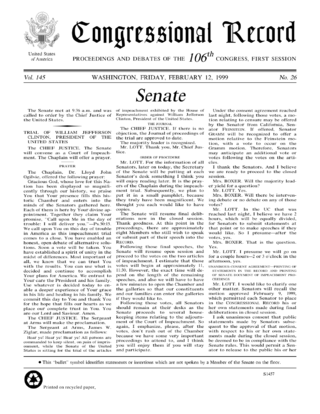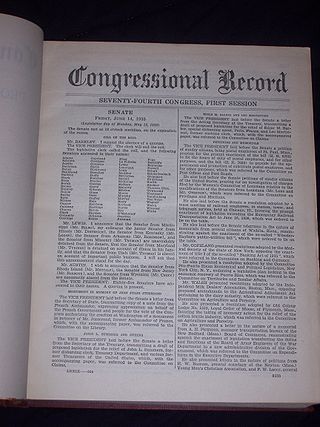- Congressional Record
-
 A page from the February 12, 1999 edition of the Congressional Record, published during the impeachment trial of former President Bill Clinton. Formal citation: 1999 Congressional Record, Vol. 145, Page S1457 .
A page from the February 12, 1999 edition of the Congressional Record, published during the impeachment trial of former President Bill Clinton. Formal citation: 1999 Congressional Record, Vol. 145, Page S1457 .
The Congressional Record is the official record of the proceedings and debates of the United States Congress. It is published by the United States Government Printing Office, and is issued daily when the United States Congress is in session. Indexes are issued approximately every two weeks. At the end of a session of Congress, the daily editions are compiled in bound volumes constituting the permanent edition. The Congressional Record is similar to the Hansards that report parliamentary debates in the Westminster system of government.
Contents
Overview
The Congressional Record consists of four sections: the House section, the Senate section, the Extensions of Remarks, and (since the 1940s) the Daily Digest. At the back of each daily issue is the Daily Digest, which summarizes the day's floor and committee activities and serves as a table of contents for each issue. The House and Senate sections contain proceedings for the separate chambers of Congress.
A section of the Congressional Record titled Extensions of Remarks contains speeches, tributes and other extraneous words that were not actually uttered during open proceedings of the full Senate or of the full House of Representatives. In years past, this particular section of the Congressional Record was called the "Appendix." While members of either body may insert material into Extensions of Remarks, Senators rarely do so. The overwhelming majority of what is found there is entered at the request of Members of the House of Representatives. From a legal standpoint, most materials in the Congressional Record are classified as secondary authority.
By custom and rules of each house, members also frequently "revise and extend" the remarks they actually made on the floor before the debates are published in the Congressional Record. Therefore, for many years, speeches that were not actually delivered in Congress appeared in the Congressional Record, including in the sections purporting to be verbatim reports of debates.[1] In recent years, however, these revised remarks have been preceded by a "bullet" symbol or, more recently and currently, printed in a typeface discernibly different from that used to report words actually spoken by members.
History
The Constitution, in Article 1, Section 5, requires Congress to keep a journal of its proceedings, although the House and Senate Journals are separate publications from the Congressional Record, and include only a record of actions and votes, rather than verbatim texts of the debates.
The Congressional Record was first published in 1873. Prior to this, proceedings, roll calls, debates, and other records were recorded in The Debates and Proceedings in the Congress of the United States (1789–1824), the Register of Debates in Congress (1824–1837), or the Congressional Globe (1833–1873). A digital collection[2] of these historical volumes is now available online via the Library of Congress.
See also
References
External links
- Congressional Record via GPO's Federal Digital System (FDsys)
- Bound Congressional Record
- Congressional Record
- Overview of the Congressional Record and Predecessor Publications
- Sessions of Congress and Corresponding Debate Record Volume Numbers
- Find Congressional Record in a Depository Library
- U.S. Congressional Documents and Debates, 1774-1875, containing the Annals of Congress, Register of Debates, Congressional Globe, and Congressional Record, hosted by the Library of Congress
Categories:- Legislative branch of the United States government
- Publications of the United States government
Wikimedia Foundation. 2010.

